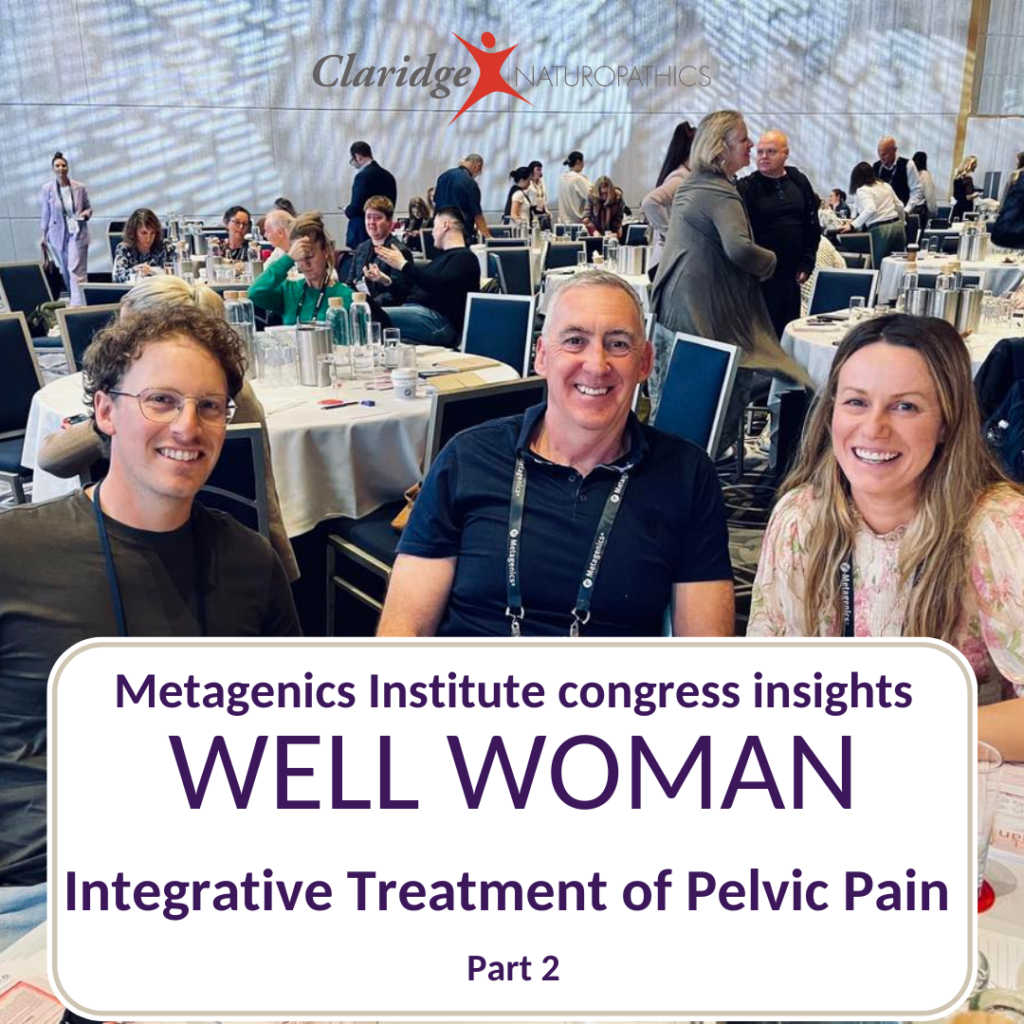Claire Hosking N.D.
Specialist Naturopath – Holistic Nutritionist – Herbalist
TOPIC 2- INTEGRATIVE TREATMENT OF PELVIC PAIN
Over the June long weekend, I was fortunate to join the Metagenics Congress in Sydney with Rob and Matt. Over the two days, we focused on Women’s wellness and the treatment of complex female conditions. We heard from various experts from Australia and around the world.
As you may be aware, women’s health is what drives and inspires me in my daily practise. The congress focused on unraveling the complexity of women’s’ health problems especially with respect to hormones. Women’s hormones fluctuate during all stages of their lives and require multifaceted management.
Considering the insights and learnings I gained from the congress, I thought I would share some of these with you across several installments.
The second topic that I would like to cover is Integrative Treatment of Pelvic Pain which was presented by Dr Peta Wright.

INTEGRATIVE TREATMENT OF PELVIC PAIN
Dr Peta Wright is a gynecologist and holistic women’s health provider. Dr Wright works with women to help identify the root cause of what’s troubling them, provide them with education about how their bodies work at their best and how things can go wrong.
As Dr Peta Wright stated 15-25% of women suffer from pelvic pain, in which 11% of those are diagnosed with endometriosis.
The gold standard for Endometriosis treatment is laparoscopic surgery but for some this may not be the best treatment for their pelvic pain. In some cases, successful surgery will equate to no pain, but is not the case for every individual.
Quite poetically put, Dr Peta advised that your level of endometriosis does not reflect your level of pain. Thus begs the question – what does this mean for those women where surgery does not ease the discomfort and pain? Is surgery their only option?
Dr Peta presented a very intriguing conversation around trauma and physical illness. According to the Australian Institute of Health and Welfare ‘trauma is an experience of extreme stress or shock that is/or was, at some point, part of life’. (1) Traumatic events are often life-threatening and include events such as natural disasters, motor vehicle accidents, sexual assault, difficult childbirth experiences or a pandemic.
Please note that I am not generalising and stating all people with pelvic pain or endometriosis have an experience of trauma, interestingly unresolved trauma can have several effects on the body.
Potentially emotional or physical trauma can make us more vulnerable to pain conditions by altering our autonomic nervous system.
In acute pain, the sympathetic nervous system (SNS) has an anti-inflammatory effects, whereas if the problem is not corrected and chronic pain results, there will be a lean towards (SNS) dominance state. This can create changes in the brain leading to neuroinflammation and altered neurotransmitter functioning. Unresolved long-term trauma can establish a SNS dominant state, resulting in changes to gut microbiome, gut permeability, immune dysregulation and inflammation.
Personally, being a sufferer of Endometriosis, I personally believe that having surgery is a choice every individual should have the option to make. I found this presentation very enlightening after hearing this feedback from clients (and even from my own experience) post-surgery where my pain didn’t subside but rather changed. Laparoscopic surgery can have life changing results for many that choose to have it, but where I think Dr Peta’s conversation was thought provoking was also around how many surgeries are required in a individual’s life with endometriosis. Surgery has a huge impact financially and physically and I agree that while it is classified as the gold standard, I don’t believe it’s the only treatment that can be explored.
Daily I see beneficial changes rom the support of herbs and nutritional supplements in those with chronic pelvic pain and those with endometriosis. However,where I see the most change is when herbs and nutritionals are combined with lifestyle tools such as meditation and breathing.
If we are able to use supportive practices, that enhance balance in our nervous system, we are potentially able to better support our pain cycles.
Below are some suggestions as to we can further support pelvic pain –
- Reducing inflammation via the diet by eating an abundance and variety of vegetables and increasing our good fats (nuts/seeds/deep sea fish)
- Supporting our microbiome by eating a wholefood high fiber diet
- Work with a pelvic floor specialist i.e. Pelvic Physio
- Body mind therapists to reduce central pain amplification
- A focus on lifestyle practice’s that help to calm and regulate the nervous system – meditation, breathwork, yoga, dance and art.
(If this does not resonate for you know that meditation and mindfulness does not come in the form of a formal seated practice. I believe it comes down to finding your form of meditation. Your place where you are able to be mindful. This may come in the practice of painting, drawing or knitting or walking in nature daily).
- Find joy in your life – never underestimate the power of gratitude, finding the small things that remind us why we choose to keep living. Try to find reminders that your body is not broken as this can be something we tell us ourselves constantly when we live in pain.
I want to thank Dr Peta Wright for her courageous presentation on what I believe is an area that needs to be more openly discussed.
Keep an eye out for my next post in this series from the Well Woman congress in which I will cover the highlights from Perimenopause presented by Dr Lara Briden.
If you have any further questions on Integrative Treatment of Pelvic Pain or would like to make an appointment as I would love to discuss how Naturopathy can support you.
In health and happiness,
Claire
Reference:
Australian Institute of Health and Welfare, July 2022 ‘Stress and trauma‘
